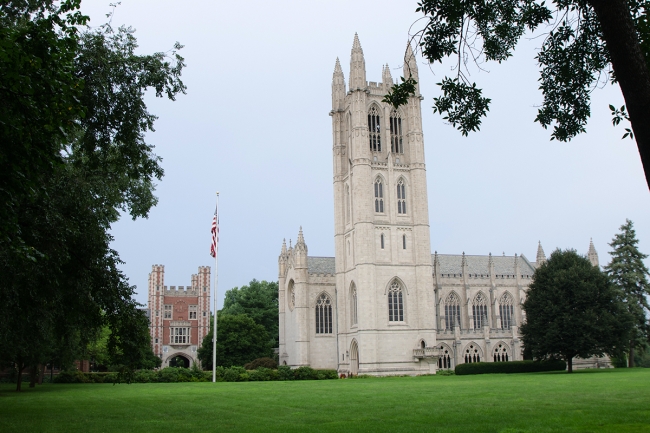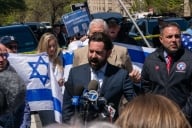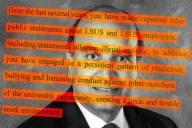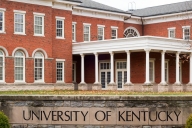You have /5 articles left.
Sign up for a free account or log in.

Trinity College's president, Board of Trustees chair and dean of faculty have contested the faculty's investigative power.
A professor’s complaint against two deans has grown into a conflict over shared governance and the faculty’s investigative powers at Trinity College in Connecticut.
Last fall, the private college’s faculty ombud found that the dean of faculty, Sonia Cardenas, and an associate dean, Takunari Miyazaki, had tried to pressure a professor to retire after conducting a “climate assessment” of the professor’s department, according to documents provided to Inside Higher Ed on condition of anonymity.
When they met with the professor, Cardenas and Miyazaki refused to reveal what that assessment found, wrote the faculty ombud, Shane Ewegen. “Attempting to use a sealed document as leverage by which to induce a faculty member to retire amounts, in my view, to flagrant coercion, and thus gross maladministration and abuse of power,” Ewegen wrote in his Sept. 20, 2022 report.
The unnamed professor said he was offered phased retirement and honorary emeritus status if he left Trinity, Ewegen wrote—but was told that if he didn’t leave, the assessment would be shared with Trinity’s Office of Diversity, Equity and Inclusion. Because the deans believed the climate assessment contained “incriminatory information” about the professor’s treatment of students and faculty members, Ewegen wrote, it was “extremely reckless for them to even hint at not releasing the report.”
Ewegen also found it disturbing that a Trinity lawyer advised Cardenas, who is also the college’s vice president for academic affairs, not to answer the ombud’s questions. “The Trinity administration—including its dean of faculty, who of all people ought to embody and support the principles and policies set forth within the Faculty Manual [italics in original]—are being advised by Trinity’s lawyer to violate the Faculty Manual,” Ewegen wrote.
That manual says the ombud has the “right to inquire of any member of the faculty, administration, student body [or] member of the clerical and custodial staffs, in connection with the ombud’s proper inquiries and to receive full and complete answers.
The ombud referred the case to the Trinity faculty’s Academic Freedom Committee (AFC), which released its own report this June. It examined a smaller set of the professor’s complaints than the ombud had, but largely echoed the ombud’s criticisms.
“If the climate assessment did indeed, as the deans suggest, raise ‘serious concerns about a possible violation of college policy,’” the committee wrote, quoting from a four-page response it received from the deans, “then those allegations should have been referred directly and immediately to HR and the Office of DEI. Those entities could then conduct a formal investigation to determine whether or not the allegations were true, and if so, would also determine whether and which sanctions were appropriate.”
“Instead,” the committee wrote, “the deans intervened and suggested that professor X retire which, regardless of their intent, had the effect of circumventing the college’s official investigatory processes and denying professor X the due process that the college’s official processes are meant to guarantee. The AFC has determined that this constitutes maladministration.”
The deans’ refusal to participate in the committee’s hearing process, the committee wrote, made “a mockery of the concept of shared governance, a commitment affirmed and reiterated many times by the dean of faculty and other members of the administration.”
Cardenas and a spokeswoman for Trinity College provided emailed statements for this article, but did not agree to be interviewed.
The college’s president and the chair of its Board of Trustees, along with Cardenas, have responded to the AFC report by disputing its conclusions and questioning the faculty’s investigative powers. (The college’s website says Miyazaki is on leave.)
Joanne Berger-Sweeney, the president, and Lisa G. Bisaccia, the board chair, wrote to faculty members last month that “following an extensive investigation, an external expert hired by DEI to investigate the professor’s grievance concluded that the actions of the deans were not inappropriate [italics in original].”
The college leaders wrote that “The deans hold administrative positions that report to the president of the college and as such cannot be compelled by a faculty committee to participate in its hearings.”
“Any provisions in the Faculty Manual that contradict or are inconsistent with Trinity’s charter and/or statutes are inherently problematic,” Berger-Sweeney and Bisaccia wrote. “We believe that the authority the Faculty Manual allegedly grants to the AFC to investigate nonacademic freedom grievances, including broadening that authority to include review of the actions of administrative leadership reporting to the president, falls into this problematic category.”
Katherine Bergren, the AFC’s current chair and an associate English professor, wrote in an email to Inside Higher Ed that “AFC’s proceedings are confidential, so I can’t share information.”
Deep divisions and competing accounts
Though the professor who complained he was pressured to retire isn’t named in the ombud or AFC reports, emails provided to Inside Higher Ed on condition of anonymity make clear that it’s John D. Mertens, an engineering professor who still holds his faculty position at Trinity.
When contacted by Inside Higher Ed, Mertens said college leaders “continue to double down foolishly. And now we are in a very unfortunate situation that I would call a constitutional crisis.”
He said the college hired an attorney, Scott Roberts, “to perform a DEI investigation of me,” but that Roberts’s report “found zero evidence of any wrongdoing by me.” Mertens said “the college has forbidden me from sharing” that report.
Trinity College did not provide a copy of the report to Inside Higher Ed. When contacted, Roberts declined to confirm that he worked on any investigation of Mertens, though he acknowledged that he has done some work for the college.
Mertens said the allegations against him were “false and they had been investigated twice before by the dean of faculty office and by HR and Title IX.”
The faculty ombud’s report says that in December of 2019, Mertens complained about another faculty member allegedly mistreating students, and, at another unspecified time, complained about yet another faculty member regarding academic freedom concerns. These complaints made it into the ombud report because Mertens complained about Cardenas’s handling of these past situations, in addition to the alleged pressure to retire.
That report doesn’t name these other faculty members or their department. Ewegen, the ombud, said in an email to Inside Higher Ed that “rules of confidentiality prevent me from sharing any information about the matter.”
Cardenas wrote to the AFC in December 2020 to disagree with the committee’s conclusions that an unnamed faculty member had “violated complainant’s academic freedom.” It was an earlier example of the dean of faculty disagreeing with the AFC.
“In this letter she reiterates her objection to AFC’s jurisdiction and poses a series of questions to them regarding (and objecting to) the particulars of their findings … She then indicates that because a ‘faculty member of color is involved’ she felt obliged to articulate her objections,” the ombud report said.
August of 2021 brought the announcement of the climate assessment, which eventually led to the current dispute over faculty investigation powers.
Miyazaki told members of the engineering department that month that a consultant, Kevin Kinne, would be speaking to them individually as part of a climate assessment. “All interviews will be confidential so you are able to fully and freely share your thoughts with him,” Miyazaki wrote. “The focus will be to identify common themes, and individual identities will not be associated with these themes.”
Kinne is on vacation and didn’t respond to requests for comment.
In a subsequent message to the AFC, Cardenas referenced student complaints, but didn’t explain what they were about. “Serious accusations of potential harm were at stake and multiple internal procedures had been used, but the department was at a standstill and locked in conflict, affecting the ability of both students and faculty to succeed and their willingness to remain” at Trinity, she wrote.
“These assessments were in response to longstanding and serious complaints by most members of a department against each other; these were deeply divisive situations, with various competing accounts,” she wrote, and added: “Some of the accusations involved potentially serious violations of college policy and the law, raising questions of safety and accountability.”
After the climate assessment, Cardenas and Miyazaki invited Mertens to a January 2022 meeting on “a confidential personnel matter.” Mertens asked the faculty ombud to come with him, Ewegen said in his report. But before the meeting, he wrote, “Cardenas contacted me to ask me to clarify my intention in attending, asking ‘do you think this is permissible given that complainant does not even know the subject’” of the meeting.
Ewegen didn’t end up accompanying Mertens. The Academic Freedom Committee report quotes from an email Cardenas sent to him, saying she didn’t think it was in Mertens’s “interest to have someone present.”
According to the ombud's report, Mertens said that in the meeting “he was told that the climate assessment that had been conducted of the [blank] department contained information that implicated him in various violations of college policy (including DEI policies) and that its release could (therefore) potentially damage his character and reputation.”
The ombud reported that in a follow-up email on Feb. 3, Cardenas wrote to Mertens, “I wanted to check in and see if you are interested in discussing further the retirement option. In terms of timing, you should know that we are preparing the executive summary of the climate assessment to share with the department, at which time I will also report the findings to the Office of DEI. Again, if you are interested in further discussion, I am happy to do so.”
After Mertens chose not to retire, the assessment was released to the Office of DEI, the report said. “Complainant was told in the email from Miyazaki from Aug. 17, 2021, that common themes that arose through the interviews would not be associated with particular people,” the ombud wrote. “However, this is exactly what has happened.”
The ombud concludes that the department’s faculty members were “thus either deliberately misled about the true intentions of the climate assessment or were subject to a gross violation of its original and stated intentions.”
Near the end of his report, Ewegen concludes that “the continued efforts to investigate complainant for issues that have already been resolved through other mechanisms DOES [caps in original] qualify as harassment.” Ewegen referenced Title IX and AFC hearings in 2020 and a meeting with a former dean in 2018 that Mertens had already been through.
Ewegen also accuses Cardenas and others who didn’t answer his questions of “acting out of disregard (if not contempt) not only for the office of the ombud, but also for the faculty body itself, which established the ombud’s powers, responsibilities and rights.”
Contested investigative powers
Cardenas declined to be interviewed for this article, instead providing Inside Higher Ed with a statement from the college asserting that “In fact, the dean of faculty and the associate dean collaborated with the faculty investigations by the Academic Freedom Committee.”
The Academic Freedom Committee’s report disputes this. It says Cardenas and Miyazaki declined to participate in its proceedings beyond providing written statements. “We waive our rights to participate in any proceedings leading to a decision,” they wrote, per the report. “You have the information you need on our end. There is an open investigation at the college level, and it would be inappropriate for us to participate in a hearing.” Mertens said the investigation is over and resulted in no discipline for him.
The AFC report criticizes the use of climate assessments at Trinity. “These assessments constitute an unregulated intrusion into faculty affairs,” it says. “They were developed entirely within the dean of faculty’s office without consultation with faculty. They are not sanctioned by the Faculty Manual. The dean can call for one at any time, using procedures subject to no oversight or rules decided upon by the faculty.”
The report points out that “at least in the case of the [unnamed] department’s climate assessment,” a faculty member was subjected to the HR and DEI grievance process “without any formal claims having been made.”
“The AFC understands that any violation of college policy or the law must be pursued,” its report says. “But in that case, those participating in a climate assessment should be made aware of this possibility and the concomitant exceptions to the promise of confidentiality that these cases would require.”
Trinity’s statement to Inside Higher Ed defends the use of a climate assessment. “The deans followed best practices in reporting allegations of discrimination against a faculty member to the appropriate college-level process,” it says. “The faculty member’s accusations against the deans were investigated thoroughly by an external expert, who concluded that the actions of the deans were not [italics in original] inappropriate.”
In their July email, after complaining about the AFC’s investigation process, Trinity’s president and board chair asked the secretary of the faculty to meet with Cardenas “to identify areas of inconsistency between the Faculty Manual and the college’s charter and statutes and to propose amendments to the Faculty Manual that will resolve such inconsistencies.”
The college, in its statement to Inside Higher Ed, said, “The president has now asked the faculty secretary and the dean of faculty to develop a process, following principles of shared governance, that will ensure consistency of policies across the college. In matters of the Non-Discrimination Policy and investigations into faculty conduct, we are unable to comment further.”








